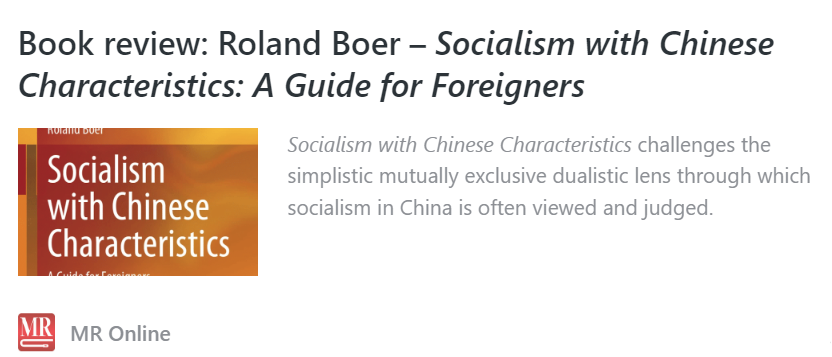
Published 2021/07/14
INTRODUCTION BY CHINA ENVIRONMENT NEWS:
The author, Roland Boer, is a Professor of Marxist philosophy in the School of Marxism at Dalian University of Technology in China, and a member of the Communist Party of Australia. He lives in China and is fluent in Mandarin.
Earlier, he taught at Renmin University of China and in a number of universities in Australia. He has also been a visiting professor in the Academy of Marxism in Beijing (within the Chinese Academy of Social Scences).
He recently published the highly acclaimed monograph Socialism with Chinese Characteristics – A Guide for Foreigners (2021), and will soon have published with Renmin University Press a work entitled Friedrich Engels and the Foundations of Socialist Governance.
Roland Boer’s book covers the whole system of Socialism with Chinese Characteristics, dealing with Deng Xiaoping’s theory, the socialist market economy, a moderately well-off (Xiaokang) society, China’s practice and theory of socialist democracy, human rights, and Xi Jinping’s Marxism. In short, the resolute focus is the Reform and Opening-Up.
The practice of socialism with Chinese Characteristics is one of the most important global realities today. However, the concept and its practice remain largely misunderstood outside China. This book sets to redress such a lack of knowledge, by making available to non-Chinese speakers the sophisticated debates and conclusions in China concerning socialism with Chinese Characteristics. It presents this material in a way that is both accessible and thorough.
Below we present the author’s preface as a useful insight into what Professor Boer seeks to do in the book. We also provide a link to a review of the book by Dr Tamara Prosic which recently appeared in the Monthly Review.
PREFACE BY PROF BOER
Let me begin with a quotation from Mao Zedong:
“Some foreigners say that our ideological reform is brainwashing. As I see it, they are correct in what they say. It is washing brains, that’s what it is! This brain of mine was washed to become what it is. After joining the revolution, it was slowly washed, washed for several decades. What I received before was all bourgeois education, and even some feudal education.” (Mao Zedong, quoted in Shao, 2017)
Mao was speaking to Chinese students studying in Moscow in 1957, but his words are still resonant today. For me at least, the in-depth study of Chinese Marxism, of socialism with Chinese characteristics, has required a washing of my brain, a washing that has taken a dozen years or more. Why?
‘LIBERATING THOUGHT’
When I first came to China, I thought I was open-minded, thought that I did assume the frameworks and assumptions with which I had been brought up and educated. How wrong I was. Like other foreigners, I had developed an opinion about China that was quite erroneous. This is particularly so for those from the small number of countries that make up the ‘West’ (containing about 14% of the global population). I have found that those who have grown up in socialist countries past and present—find it much easier to understand socialism with Chinese characteristics. This is also the case for the many who come from developing countries, for there too is a living memory of the experience of colonial depredation at the hands of the ‘West’. So if you are like me, having been brought up and educated in one of the few Western countries, then you may well need to engage in a process of washing your brain so as to be able to understand socialism with Chinese characteristics, or sinified Marxism.
Another way of putting it is ‘liberating thought’, a term that became a central feature of Deng Xiaoping’s tenure and crucial in the launching the Reform and Opening-Up. For Deng, liberating thought entailed liberation from old dogmas and assumptions about what socialism should be and indeed what capitalism was. To be clear: this is not some liberal ‘freedom of expression’ that simply reinforces Western liberal frameworks. Instead, the liberation of thought is central to the correct theoretical line of Marxism itself: Marxism is not a dogma, but a guide to action, a method for analysis and a framework—in China—for the construction of socialism. By now it should be obvious that I will have much to say concerning Marxism in this book. The simple reason is that Marxism is front and centre in the Chinese project of constructing socialism. Socialism? Yes: I agree with the vast majority of Chinese scholars and common people—along with not a few in many other parts of the world—that the Chinese project is indeed a socialist project. Thus, if you want to understand China, you need to understand Marxism, especially Chinese Marxism. Those who ignore Chinese Marxism risk profound misunderstandings of China and its path.
My primary focus is the Reform and Opening-Up, launched by Deng Xiaoping and the CPC in 1978. I will also have much to say at various points on the longer Marxist tradition—especially on the development of contradiction analysis and the theory of socialist democracy. But my focus remains the distinctly Marxist project of the Reform and Opening-Up.
As I indicate in the introductory chapter, this book primarily uses research undertaken by Chinese Marxist scholars in order to understand socialism with Chinese characteristics. This research has thus far been overwhelmingly published in the Chinese language and has not been studied outside China as much it should have been studied. Although there are some notable exceptions—Domenico Losurdo, Colin Mackerras, Nick Knight, Stefano Azzarà, and Barry Sautman—I do not find much Western material on China particularly useful. Most of these latter works fall into the trap of ‘using Western categories to understand China [yixi jiezhong]’. Even more, when an occasional Western Marxist feels called upon to opine about China, we find that such an effort ‘uses Western categories to understand Marx [yixi jiema]’. For these reasons and more, it is necessary to deploy the extraordinary depth and range of Chinese Marxist scholarship to understand socialism with Chinese characteristics.
For those who want a more traditional book review, please check out the review by Dr Tamara Prosic of the School of Philosophical, Historical and International Studies, Monash University, Australia, which appeared in the Monthly Review, June 21, 2021.
BOOK REVIEW BY DR TAMARA PROSIC
https://mronline.org/2021/06/21/book-review-roland-boer-socialism-with-chinese-characteristics-a-guide-for-foreigners/

Those who wonder whether China is still socialist or suspect that the Communist Party of China abandoned Marxism … in fact, anyone who wants to engage seriously and extensively with ‘socialism with Chinese characteristics’ , should read this book. I never doubted that China is socialist. China wants to lead by example and Boer’s book certainly shines a very bright light on the ins and the outs of that example.
Dr Tamara Prosic, Monash University, Australia.
Source: Roland Boer, 2021, Extract from Preface, ‘Socialism with Chinese characteristics: a guide for foreigners’
More information on Professor Boer’s work: https://roland-theodore-boer.net/